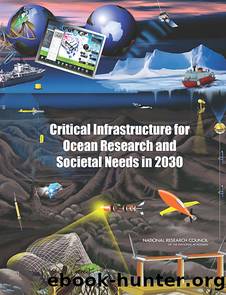Critical Infrastructure for Ocean Research and Societal Needs in 2030 by National Research Council of the National Academies

Author:National Research Council of the National Academies
Language: eng
Format: epub
Tags: Earth Sciences : Ocean Studies. Policy for Science and Technology : Policy for Science and Technology
Publisher: NATIONAL ACADEMIES PRESS
Published: 2011-06-24T00:00:00+00:00
Community-Wide Facilities
Currently, there are a limited number of community-wide facilities and organizations in the ocean sciences; their development is usually driven by cost and expertise issues. However, the logistical challenges inherent in conducting ocean research have led to increasing use of such facilities. These efforts are usually a means to address the technical needs and costs required for (1) platforms, sensors, and analytical equipment; (2) compiling, managing, and maintaining large complex data sets; and (3) computing and modeling. Facilities that are supported and accessed by a broad base of ocean science users can focus on specialized areas of ocean infrastructure, while providing cost effectiveness and standardized, reliable services.
One of the most successful examples is the growth of data and modeling centers (e.g., NOAAâs National Oceanographic Data Center and National Geophysical Data Center, National Center for Atmospheric Research). Numerous data centers have been created over the past 20 years and, given the diversity of new observation systems, the range of data available to the broader community (including education and the interested public) through distributed data centers are very likely to grow. Barriers to be overcome include data accessibility and impediments to collaboration, which are critical to continued success. For community-wide facilities that provide laboratory analyses, independent verification and calibration is needed to provide sustained confidence in the data being produced.
Successful community-wide organizations need broad support at several levels of government. UNOLS has been an exemplar of this type, having strong engagement between academic, state, and federal partners. UNOLS provides academic and government oceanographers with access to the research fleet through coordination of ship schedules and operations, as well as managing standards and safety and ensuring standard instrumentation aboard each vessel. It also schedules deep submergence assets (HOVs, ROVs, AUVs) and use of research aircraft. By 2030, it is expected that consortia similar to UNOLS could facilitate broad community access to other infrastructure assets, including other mobile or fixed platforms (e.g., AUVs, gliders, drifters, moorings, seafloor cables and nodes, UAVs) or expensive analytical equipment. The creation of new community-wide facilities for ocean research infrastructure will be dictated in large part by technology innovations that either simplify operations and maintenance requirements or lower purchase and operation costs, as well as broad involvement and acceptance. However, they could also be driven by federal agencies as a means to maximize infrastructure effectiveness while minimizing costs.
Download
This site does not store any files on its server. We only index and link to content provided by other sites. Please contact the content providers to delete copyright contents if any and email us, we'll remove relevant links or contents immediately.
The Lonely City by Olivia Laing(4799)
Animal Frequency by Melissa Alvarez(4462)
All Creatures Great and Small by James Herriot(4311)
Walking by Henry David Thoreau(3953)
Exit West by Mohsin Hamid(3824)
Origin Story: A Big History of Everything by David Christian(3687)
COSMOS by Carl Sagan(3618)
How to Read Water: Clues and Patterns from Puddles to the Sea (Natural Navigation) by Tristan Gooley(3466)
Hedgerow by John Wright(3354)
How to Read Nature by Tristan Gooley(3335)
The Inner Life of Animals by Peter Wohlleben(3311)
How to Do Nothing by Jenny Odell(3294)
Project Animal Farm: An Accidental Journey into the Secret World of Farming and the Truth About Our Food by Sonia Faruqi(3216)
Origin Story by David Christian(3195)
Water by Ian Miller(3179)
A Forest Journey by John Perlin(3069)
The Plant Messiah by Carlos Magdalena(2927)
A Wilder Time by William E. Glassley(2859)
Forests: A Very Short Introduction by Jaboury Ghazoul(2836)
